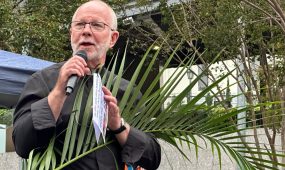How the Church is marginalising itself and blames everybody else
Reflections
“The constancy with which I am presented with a question that assumes an incompatibility between science and religion demonstrates how effectively such ideas can get traction in the public consciousness and how long such perceptions can last,” says The Very Rev’d Dr Peter Catt

“When did you stop believing in science?”
I have been asked that question an amazing number of times over the past 30 years. I am usually asked it by someone who has little, if anything, to do with the church when they discover that I completed a PhD in evolutionary biology before I was ordained.
These people believe that all Christians are Creationists who think that God made the world in seven days in the year 4004 BC. They therefore assume that we pay no heed to science.
For them, we are numbered among the anti-vaxers and flat-earthers. They see us, at best, as benign adherents to quaint fairy tales. In terms of their life, we are marginal and of no practical consequence.
The constancy with which I am presented with a question that assumes an incompatibility between science and religion demonstrates how effectively such ideas can get traction in the public consciousness and how long such perceptions can last. Partly this is to do with the media’s fascination with the weird and the wonderful.
But it also illustrates the determination and dedication of those driven by such ideologies. A dynamic we see not only in religious groups but also in politics and other spheres of life. The hold that the ideology of Climate Change Denying has on our politicians being a case in point.
In terms of the mission of the church, the perception that Christians don’t take science seriously and are given over to reality-denying ideologies is incredibly detrimental. It causes people to look for meaning, direction and purpose elsewhere. The growth of “the spiritual but not religious” group is partly an expression of this.
Advertisement
While the Creation Bus was finally parked about 10 years ago and Creation Magazine these days caters to a small niche market, and while the bulk of Christians have moved on from a dogmatic and narrow reading of the Creation stories, that same way of using the Bible has been repeated again and again.
And every time it is used, the mission of the church is trashed, and the church finds itself further marginalised.
When society began to come to terms with the fact that some marriages are destructive, that some marriages die as people change, and that people do get divorced and are often lucky enough to find a new life-giving relationship, the church dug in its heels. Based on a particular reading of the Bible it insisted that the destructive relationships needed to be defended as holy and battered women were to be encouraged to stay in order to protect the institution of marriage.
Again, ignoring reality and good evidence, divorced people were treated like second-class citizens, their new relationships were left unacknowledged and uncelebrated, and many vulnerable people are still coerced into staying in destructive marriages.
And, while much of the church has moved on and in many places has found that it can celebrate with divorced people their new life-giving relationships, the pain of the years of prohibition remains and in some pockets of the church the anti-divorce rhetoric has escalated.
Advertisement
The destructive pattern is repeating itself as the church tries to deal with gender roles. Again, a particular way of using the Bible has people determined to protect culturally bound stereotypes as divine fiat. And while much of the church has found a way to move on and to be enhanced by the leadership of women, in other places men can only be taught by men, and men are required to be the leaders of churches and heads of households. Once again, the lessons from science and societal evolution are cast aside and many in the church portray themselves as social Neanderthals who think of women as literally the “weaker sex”.
Also, in recent memory there is the churches’ contribution to the marriage equality debate. Some of the “No” case was offered in sensitive ways. Other contributions were based on a particular use of the Bible that led its proponents to once again ignore good science and experiential evidence to advance arguments that were both untrue and profoundly damaging.
In the wake of the marriage equality debate, some church communities have developed a fixation on gender diversity and as well as continuing their crusade against same-sex-attracted people. As a result, Victoria has found it necessary to ban “Gay Conversion Therapy” and other States are considering the need to do the same.
Late last year I attended a Queensland Government sponsored consultation on the need for such legislation in that State. I was honoured to be a Church voice in that forum but also horrified by the stories of what some church communities are telling people. Each and every story helped to trash the mission of the Church. We are in a sad place when people who are noted for being open to evidence and are experienced as welcoming, accepting and compassionate are seen as anomalies.
There are signs that the marginalisation that sections of the church are working so hard to achieve for the whole church is bearing other fruits as well.
As the Israel Folau case illustrates, there is a narrative developing that interprets resistance to the furthering of the destructive practices as religious persecution. Religious persecution is a very serious matter, a matter of life and death for many Christians and people of other faiths throughout the world. To align oneself with them, because one’s teaching about women being subservient to men or the proclamation of approaches to human sexuality that lead to increased rates of youth suicide, is being called out as self-indulgent and trivialises the plight of those who are genuinely threatened for holding to their faith.
The saddest aspect of this tale is that there are many, many Christian communities in this country who are as horrified as anyone outside the church as to the way this is playing out. In these communities, people of goodwill are seeking to be a positive and progressive influence on their communities.
In these places, the Bible is taken seriously but is also understood to be a complex set of documents. These communities are sensitive to the fact that for the bulk of Christian history the Bible has been read in a variety of ways, and that modern biblical scholarship provides a way to use these complex documents to speak a life-giving word to a complex world.
It is not just people like me, who some would want to dismiss as a liberal or unorthodox, who hold this concern for the way the mission of the church is being trashed.
In his book Amazing Love: Theology for Understanding Discipleship, Sexuality and Mission, Andrew Davison, an Anglican priest based at Cambridge, who sees himself as belonging to the evangelical wing of the church, writes to those of his own camp to invite them to review their current approach to marriage equality, and gender and sexuality diversity.
He seeks to remind them that the Bible is complex and biblical interpretation is not a simple thing and that mistakes have been made in the past. Above all, he asks them to have an eye on the effect that taking hard-line positions has on the mission of the church.
Hopefully some will hear his voice. No doubt, others will dismiss his call as “following the way of the world”.
Finally, I would want to add that Christianity, with its deep insights into human nature and its understanding of the giftedness of life and the planet, could be making a very positive impact on some of the global issues that we face.
Confronting poverty, pursuing the way of peace, building a just world, setting people free from the things that bind them, looking after the planet and dealing with climate change are all issues that the depth of Christian theology and spirituality can help the human family address.
This is an edited version of an op ed first published in the Brisbane Times on 27 June 2019.






